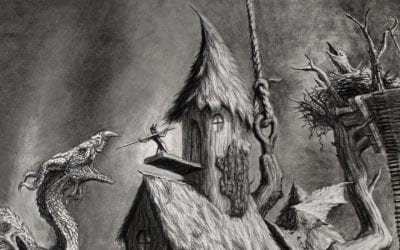Fiction by Sierra Stella
You are three years old.
You are lying on the edge of your parents’ dark wood bed, wailing. Your hair is plastered to your forehead in sodden tendrils, your damp, squirming body turning the maroon sheets nearly black with water. Your father stands above you holding a towel, trying to pat your writhing limbs dry. He makes insistent shushing noises, telling you again and again it will be OK.
But tiny pink points of pain bubble all over your skin, itching and burning with such intensity that your little body feels unbearable to live in, as though you should be able to shuffle off your outer layer like the spiders in your backyard and finally feel relief.
Footsteps thud down the long hallway and your mom, home from work, rushes to your rescue, sweeping you up in her arms and turning angrily to your father, chastising him with sharp words you won’t entirely remember, pressing faint impressions into your mind like fingerprints in Play-Doh: “gentle soap” and “delicate skin” and “irresponsible” and “can’t believe you would do this.”
Your father begins yelling. It hurts your ears.
This will be one of your first memories.
—
You are five years old.
You are sitting on the window sill in the bright little kitchen at dusk, your legs dangling from your perch. Under your parents’ raised voices, your baby brother’s screeching cries echo from the next room. Your own face is wet with tears, but you keep silent. It’s too loud in this room already. When you are older, you won’t be able to remember what this fight was about. It will blend together with the fights they always have: money, disrespect, unfair distribution of labor.
You scooch to the edge of the sill, stretching a pudgy leg out toward the floor as far as it will go, but it’s still out of reach. Over the yelling that fills the kitchen, you call, “Mommy!”
She doesn’t hear you. You try again, louder and louder: “Mommy! Mommy!”
She turns away from your father at last, face red, nostrils flaring, wisps of hair falling free from her ponytail because of her habit, which you will pick up, of running her hands through her hair when she’s upset. You reach out your hands, under eyes stinging as she whooshes you off the window sill.
You retreat from the angry kitchen into the living room, where your little brother is crying on the dark green couch with the floral patterns that your mom lay on for three months when she was on bed rest with him. He is only two, but his screaming sobs fill the room, bouncing off the wooden cabinets where the two of you play hide and seek. You sit down next to him and put your small arm around him.
You and your brother don’t get along. You’re mean to him, and bossy, and you push him around because you’re bigger than him and you know better. But tonight when you touch him, he doesn’t flinch. His sobs slowly subside as the battle in the next room rages, until the two of you sit in silence in the darkening living room.
—
You are eight years old.
You look out over the placid lake at the edge of your campsite, watching how the bright sun catches the blue dragonflies, making them glow like lightning bugs. Behind you, your father swears as he tries to set up the tent he’s carried all this way on his back. He wanted this to be a “daddy-daughter” trip, just the two of you. When you are older, you will wonder if even then he was trying to repair your relationship before the cracks had begun to show.
The sky fades to indigo ink, stars twinkling out from behind cloud cover—more stars than you’ve ever seen in the city. You can hear frogs chirping in the pond nearby. Your father makes a fire and heats up water on a camp stove to mix with the freeze-dried teriyaki he bought at a camping supply store. It tastes like feet, but you’re hungry from walking all day and you choke it down.
Half an hour later, when you’re done throwing up, your father hands you a Snickers bar. Your mom doesn’t allow name-brand candy in the house, and you eat it quickly as though she’ll pop out of the woods any moment and confiscate it. You sleep on a thin pad on the hard ground, your stomach moaning and swirling like the frogs and the stars.
Years later, as you are moving out of your childhood home, you’ll find a drawing depicting that night in childish stick figures and bright crayon: you and your father in your tent, all smiles, him looking up at the stars as you laugh at his marshmallow catching fire. It will seem so innocently happy to you, and you will realize there must have been a time when you felt like that about him. You will have forgotten.
—
You are eleven years old.
You are in the same bright little kitchen, and it is still full of rage. Your father is yelling at you about some chore you haven’t done, and you are throwing each barbed word back at him with the carelessness you know he hates. You know you’re making it worse but it feels so good sometimes to take his angry words and boomerang them in midair. Your mom is standing between you, trying to calm you both down by reasoning with you in tones too loud to be reasonable. She is not succeeding.
He calls you irresponsible, selfish, lazy (which you have come to believe you are), but you insult him back, infusing each violent word with vinegar and hate. You will not remember what was said, but something crosses an invisible line all at once.
Suddenly, he reaches past your mom and grips your arm so hard you know it will bruise, and when you look into his eyes the expression scares you. His familiar eyes light up with fury and relish as he finally yells: “You’re such a bitch!”
Every fiber of your being draws away from him. You want to be as far from him as possible, but his hand still grasps your arm. Your mom pushes him away from you, yelling at him to take a walk. She is stunned. She can’t believe he would call you that.
You are unsurprised, unreactive. It makes sense to you, after all.
He storms into the cool night, slamming the front door behind him. His words hang in the kitchen, sticking to the walls and the floor.
For years, you’ll forget this ever happened, as though it were just as insignificant as any other fight your family ever had over the old familiar topics. You’ll only remember when your mom brings it up after the divorce, standing in the same bright kitchen many years later.
—
You are fourteen years old.
You are sitting in an armchair in the living room, legs folded under you, facing the dark green couch with the floral patterns where your family sits with tears streaming down their faces. Your brother is on the far end of the couch, gasping and clutching at his chest as he’s wracked with sobs. Your mom is beside him, holding his hand, the skin around her eyes pouchy and red. Your father sits apart, on the other end of the couch, tears rolling silently down his cheeks. They are telling your brother about the divorce for the first time.
Across the room, you are trying to remember if you’ve ever seen your father cry before. Your eyes are dry.
You knew about the divorce already. Your mom told you about it while parked in a grocery store parking lot after she picked you up from your high school debate tournament. You weren’t surprised. You held her as she broke down and cried.
You look at your brother, inconsolable, drawn completely inside himself. He is in his own little world of grief, where he will remain for years. The divorce will be harder on him than on you, as all things are. His anxiety and depression will worsen. He will have panic attacks where he’s gasping for air and clutching his chest, and no matter what you try you will not be able to coax him out of them; only your mom will. He will have periods of catatonia, becoming still and silent, staring into space without comprehending the world around him. One night, when you are fifteen and he is twelve, he will run off into the dark, rainy fall night in his pajamas in a fugue state, knowing nothing but that he has to get away from you as you follow him at a distance. You will turn a corner to find his sodden slippers abandoned on the sidewalk, and hear his running footsteps retreating into the dark. When you find him again, you’ll walk beside him, holding his hand as he wanders at random until at last, near dawn, he seems to awake and allow you to lead him home. He will not remember this night.
Your mom squeezes his hand, gently, as he cries, but he doesn’t seem to notice. Over the years, she will soften and open up even as her face becomes wearier. She will never quite look her age—her eyes will always be too bright—but her face will show her stress and her anger and her many hours worked to support her children. You’ll become her friend and her confidante, and she’ll forgive you the transgressions of your angrier youth, though she’ll never quite stop reminding you of them. You’ll be treated like an adult perhaps a little too soon because she’ll need someone. You will be her someone.
But now, sitting in this familiar room at the precipice of this strange new world, you survey the tearful tableau in front of you and try to summon tears to match your family’s. They won’t come.
They never will.
—
You are sixteen years old.
It’s just a few days from your seventeenth birthday. You sit across from your father in his apartment, at the kitchen table you remember from your childhood. How strange, still, to see it in this tiny place with its blank walls and lingering smell of mold.
Your father has just gone back on his promise to let you change your name when you turn seventeen. It was the only thing you asked for.
You have been going by your mom’s maiden name, which she didn’t change when she married your father, since you were twelve years old. You remember the first time you wrote it instead of the hyphenated name you’d dragged behind you like a ball and chain your entire life; it was on one of those timed multiplication tests in middle school math. How easy it would be, you thought, how simple, to have your last name be six letters instead of sixteen. What a relief it was to see a name that fit entirely on the thin black line at the top of the paper. You started asking friends to call you that, and teachers. When they hung your art in the hallways next to your classmates’, this was the name they hung under it. When they wrote your name in the program for the school play, this was the name that appeared in cramped black type.
Your father’s name had never felt like your own, anyway. It wasn’t even his own. He was born with a different name. This name given to him when your father was six by the man who married his mother after his real father’s death, a man you have met once in your life and will remember only by the money he leaves you out of guilt when he passes away.
This name you made for yourself is your own. It is your mom’s, and her family’s, and it is yours.
For a year, you’d been asking your father to let you change it legally and been met with anger and resistance, but at last, he agreed. You’d be allowed to change it for your seventeenth birthday. You counted down the days until you could be yourself to the world. You dreamed of your own name on your college applications, your high school diploma.
But he went back on his promise, of course. You don’t know why you expected more of him.
He’s crying again.
He’s been crying more in the past couple of years. He, like your mom, has grown softer, but no less selfish. Tearfully, he tells you that it just hurts too much, that it’s his family’s name, that it’s a name he took and made something of. It’s like you’re rejecting him and his family, he tells you. Don’t you see how hard it is? Can’t you understand?
You have a distinct feeling of falling away from him.
He reaches his hand across the table. Yours remain in your lap. He couldn’t catch you if he tried (and he doesn’t). He’s not strong enough.
You glance around the apartment, avoiding his eye. This will be one of the last days you spend here, except for Christmas Eve every year, out of courtesy.
On your eighteenth birthday, you will go to the courthouse with your mom and your brother and change your name before a county judge. And perhaps you will take this name that you created on your own and make something of it yourself, without his help; perhaps you are as selfish as he is.
They will print the wrong name on your high school diploma. It will take them a year to replace it.
—
You are twenty years old.
You are in your father’s new car that smells like his new girlfriend’s old dog. You needed a ride home from work—a late shift you aren’t normally on—and he was the only one available. This is the first time you’ve seen him in a few months. You can tell he’s trying to look younger—tighter clothes, cooler shoes—but you can see the gray in his whiskers and the crow’s feet at his eyes and his fiftieth birthday fast approaching.
The two of you talk idly as you blow past other cars on the highway. He’s always been a scary driver. You stopped telling him how much it scared you after a while.
You chit chat about your lives, his work, your work, your recent study abroad trip to London with other students from your university, his upcoming vacation. He mentions, again, setting up a brunch with the boyfriend he still hasn’t met, the one you fell in love with over 4,000 miles away and brought home with you. You say that you’ll ask if he’s available sometime soon. You won’t. He’s a part of your life that your father doesn’t get to take part in.
In the dim red glow from the taillights in front of you on the dark road, you search his face for yourself. The nose maybe, a shadow’s shadow of your own. The eyes maybe, but then again too brown—much more like your brother’s.
You have known one another for two decades, for the length of your life, but there is only breeze between you now, all surface and no substance. Maybe it’s better that way. At least you haven’t seen him cry in a while.
He drops you off in front of an apartment he has never been inside, and you shut the car door behind you. In the apartment’s living room sits the same dark green couch with the floral patterns that your mom and brother helped you carry up the steps to this first apartment of many, until the worn-down couch finally bursts and spills its cottony filling. You sink into it and take out your phone.
“Hey.” Your boyfriend answers after only a few rings. “How was it?”
“It was fine,” you tell him, and it was. You ask him to come over and he says he’ll be there in fifteen.
It will become a familiar scene, sitting on this couch waiting for him to come over and make your day. Your lives will grow together like the roots of two plants placed too close together in fertile soil. You will get busy with your classes, both staggering under the weight of higher learning, but will always make time for one another. You will learn to forgive his occasional obnoxiousness and he will learn to point out when you are really being selfish and when you just think you are. You will promise never to yell at one another, and you will keep that promise.
You will see your mom and brother occasionally when you can find time every couple of months to take the hour-long bus ride to your childhood home. You will talk to your mom on the phone every other week or so, but you will learn to live apart from each other. You will be surprised, every time you return, by how much your brother has changed, how funny and thoughtful and smart he is in contrast to how you remember him. You will forget every time that he is growing up too, that he is a complete person like you, that he will be okay, after all. He will tell you that when he turns eighteen, he’s going to change his name too. But he knows better than to tell your father beforehand.
You will not see your father again until Christmas Eve. You will not see him for a long time after that.
But for now, you sit on that familiar old couch and wait for your future to arrive.


